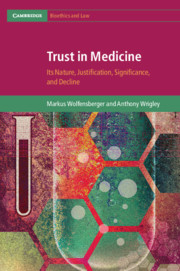Crossref Citations
This Book has been
cited by the following publications. This list is generated based on data provided by Crossref.
2019.
Trust in Medicine.
p.
250.
Horner, Jennifer
2020.
Moral Features of the Therapeutic Relationship with Adults: Dignity, Trust, Autonomy, Vulnerability, and Resilience.
Seminars in Speech and Language,
Vol. 41,
Issue. 03,
p.
212.
Yang, Qian
Young, Isaac F.
Wan, Jialin
and
Sullivan, Daniel
2021.
Culturally Grounded Scapegoating in Response to Illness and the COVID-19 Pandemic.
Frontiers in Psychology,
Vol. 12,
Issue. ,
Pavić, Željko
Šuljok, Adrijana
and
Jurlina, Juraj
2022.
Balanced Reporting and Boomerang Effect: An Analysis of Croatian Online News Sites Vaccination Coverage and User Comments during the COVID-19 Pandemic.
Vaccines,
Vol. 10,
Issue. 12,
p.
2085.
Miskulin, Maja
Mujkic, Aida
Miskulin, Ivan
Makaric, Zvjezdana Lovric
Kovacevic, Emma
Pintaric, Ljiljana
and
Pavic, Zeljko
2022.
Vaccination Attitudes and Experiences of Medical Doctors in Croatia amid the COVID-19 Pandemic: A Social Roles Conflict?.
Vaccines,
Vol. 10,
Issue. 3,
p.
399.
Nickel, Philip J.
2022.
Trust in medical artificial intelligence: a discretionary account.
Ethics and Information Technology,
Vol. 24,
Issue. 1,
Lee, Soogeun Samuel
2022.
Philosophical evaluation of the conceptualisation of trust in the NHS’ Code of Conduct for artificial intelligence-driven technology.
Journal of Medical Ethics,
Vol. 48,
Issue. 4,
p.
272.
Sarbazi, Ehsan
Sadeghi-Bazargani, Homayoun
Farahbakhsh, Mostafa
Ala, Alireza
and
Soleimanpour, Hassan
2023.
Psychometric properties of trust in trauma care in an emergency department tool.
European Journal of Trauma and Emergency Surgery,
Vol. 49,
Issue. 6,
p.
2615.
Liu, Tony H.
Vernon-Cwik, Andrea
and
Tun, Sandy
2024.
Examining a Novel Legacy Activity for Elders: Oral Histories as Produced Stories.
Palliative Medicine Reports,
Vol. 5,
Issue. 1,
p.
25.
McFarland, Daniel C.
Grassi, Luigi
and
Riba, Michelle B.
2024.
The Complex Role of Patient Trust in Oncology.
Vol. 5,
Issue. ,
p.
1.
Jain, Raunak
Singh, Mrityunjai
Rao, A. Ravishankar
and
Garg, Rahul
2024.
Predicting hospital length of stay using machine learning on a large open health dataset.
BMC Health Services Research,
Vol. 24,
Issue. 1,
Napol'skih, Inna
2025.
FEATURES OF THE MANIFESTATION OF TRUST IN THE HEALTHCARE SECTOR: A LEGAL ANALYSIS.
Advances in Law Studies,
Vol. 13,
Issue. 1,
p.
31.



